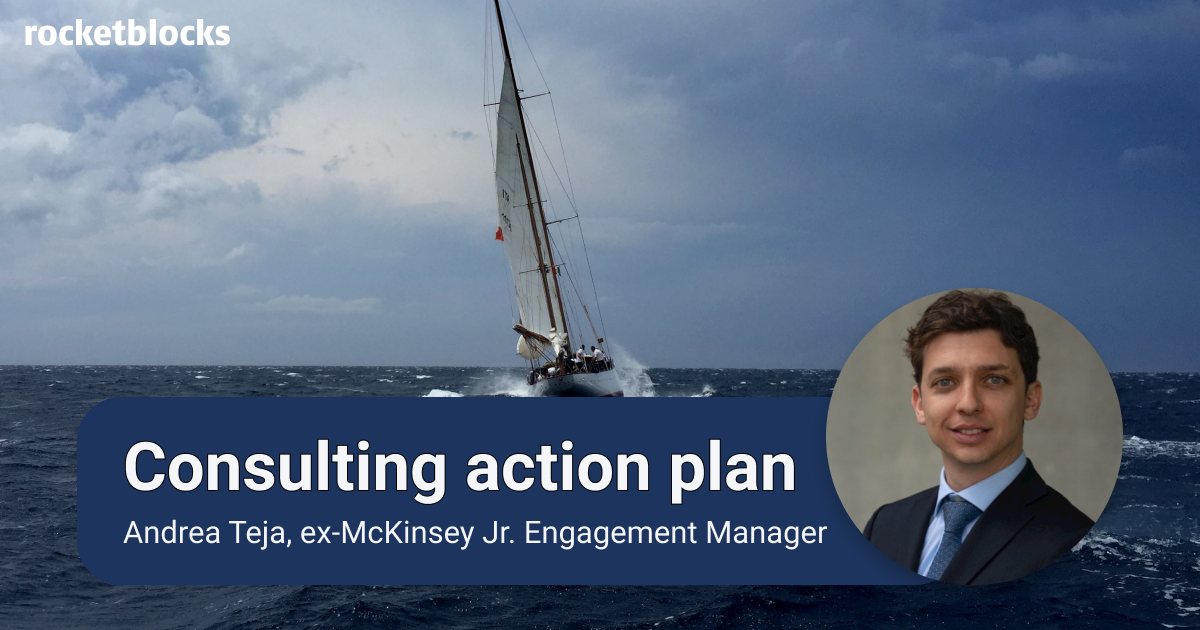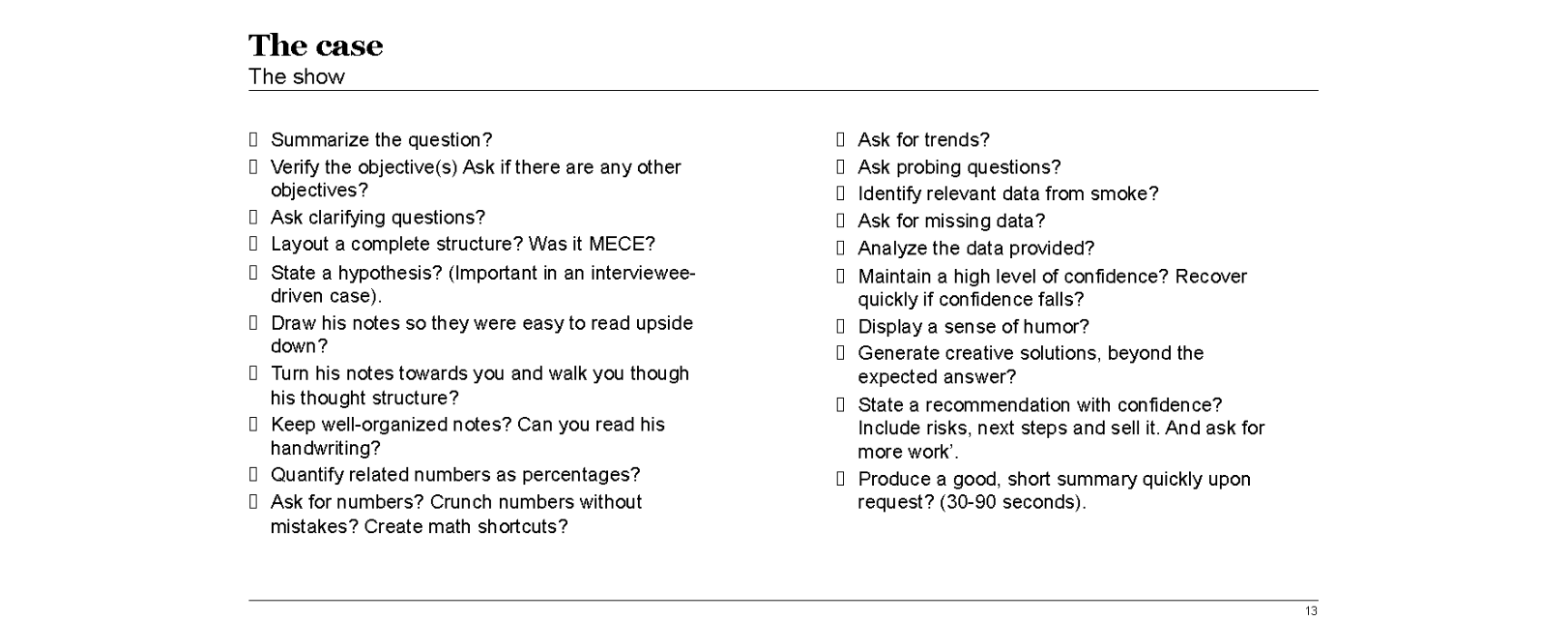McKinsey interviews - interview prep plan
A step-by-step recruiting and interview prep template for how to land a consulting job in 5 big steps
|
|
|
Understanding consulting | Tackling cases | Acing cases | Fit interview overview | Fit interview prep
My starting point: when I left the Navy, before my MBA, I had no clue on what McKinsey was or, in general, what was the consulting industry.
My end point: At the end of my MBA, I applied to all 3 MBBs + 1 boutique...I aced and landed all 4 offers. I then accepted Mckinsey with an entry level of Associate.

The action plan I used was a pragmatic, tactical and strategic approach to get into consulting. I told myself to be focused (“no wind is in favor of a sailor if the sailor doesn’t know where to go”), be ambitious (“a warship in a harbor is safe, but that’s not the purpose of why a warship was built”), believe in myself (no one will believe in myself if I wasn’t the first one to do so) and finally never never never give up (I told myself, that it might happen to go down, but it’s important to get back up and fight for what I wanted).
To join consulting you need a pragmatic, tactical and strategical approach that I planned in 5 big steps:
- Understand what is the consulting industry
- Understand what is a case-interview and how to best tackle it
- Practice to ace the case-interview
- Understand how to tackle the consulting-fit-interview
- Practice to ace the fit-interview
- Finally…get an interview offer
1. Understanding the consulting industry (Top)
Time: 3 months before the start of your MBA up to when you send your application or in general 9 months before applying
Consulting world has its own rules, business model and “not written policies”. It’s important to understand them in order to get in that world. I once asked a Senior Partner what was the difference between him and a CEO, or in other words what’s the difference between the corporate world and the consulting world. He told me “I know almost all the most important CEOs of this country, I am able to help them focus on strategic directions where they can create a huge impact for their company, I am able to guide them towards new scenarios or support a new operating model… They call me because they trust me… but at the end of the day I am just a councilor, I advice only, I don’t make things happen. A CEO instead has the responsibility, has the ownership of the P&L, has to convince investors, has to hire the best talents… As a Senior Partner, I can give the best advice ever, but it still will be a recommendation”. Well in these words I think you can find the essence of a mgmt. consultant: listen to your clients, define the problem, dig deep in the problem and find a solution, validate if the solution makes sense for the client, give a recommendation to the client on that solution. But, still, it will always be a recommendation. From these lines, you can also infer a few important skills of a consultant: listening, communication, analytical skills, empathy, social intelligence.
Go on LinkedIn and start your networking research. Find junior people first, maybe someone that you know, or with whom you have a friend in common, or look at alumni of your MBA. Start with junior people (max managers level not more). Send a super polite message to them, try to fix a coffee chat with them and start to ask them about consulting. No questions concerning your application for now, and most importantly don’t ask for a referral! Just a genuine talk with them to understand the lifestyle, the type of job and the company. Do this for at least 2/3 people for each consulting company you have in mind.
Validate if you are still interested in consulting after this first round of interviews
Make clear what your target companies are! Don’t just rely on MBBs, consider also other companies that are as interesting (e.g., Kearney, Strategy&…). Have a clear bucket of targets
Now you need to reach out to the senior people! Ask your junior connections (that you ping in for the above first round of calls) if they could help you to find a slot with a more senior employee of their company (junior partner, partner). Again, don't beg for an interview, it’s just a get-to-know or even better a get-to-know about the consulting world
By the end of this first stage you should have:
- A network of at least 2/3 junior in each company you are interested
- A network of at least 1 senior in each company you are interested
- Understood the consulting world
Ping me if you want better advice on how to build your personal network or deep mechanism of the consulting industry (what does a consultant do in their day to day…).
2. Understand the case interview format (Top)
Time: at the start of your MBA or in general 6 months before applying
A case-interview is not a normal interview. It’s important to understand the way it works. It’s basically a small representation of what you’ll be doing if you get the job. Therefore, this is how you need to tackle it. It’s not only about how you do the math quickly but it’s about showing that you can stay in front of a client, solve a problem and give a recommendation. For a crash course on case interviews check out this blog post by an ex-BCG Consultant on case interview fundamentals, core skills tested, and how to prepare. A case-interview will be divided and you’ll be judged in 3 areas: (i) the starting point, structure and your ability to scope the problem (ii) the show, how you drive the case, the math, the way you act and communicate (iii) the recommendation.
Read my one-pager on the step by step case-interview show (below)

Go back to the 2/3 junior folks you linked up in step 1 and asked them (always in a polite mode) to describe you a little bit more in depth what is a case-interview and how it works (don’t ‘ask for a mock case, you are not ready!!!)
By the end of this first stage you should have:
- Clear idea of how a case-interview is structured
Ping me if you want better advice on how a case-interview is structured. I can squeeze in one coaching session tips for point 1 and point 2.
3. Practice to ace the case interview (Top)
Time: 4-6 months before applying
Now it’s time to practice. First you don’t need 60 cases!!!! That is an insane idea that someone follows. I am more for this proportion: divide your preparation in 40% dedicated to actual cases, 30% used this time for drills (we’ll go into them in a sec) and last 30% dedicate this time for fit-prep.
Divide the time you have since now to when you’ll apply in that 40-30-30 approach that I mentioned
Start with a case – a real case but with an expert – see what happens… rank yourself on 1 to 10… was it so bad? Usually yes…, no worries!
Prepare your personal notebook in which you’ll write all your notes of all your case-interview preparation
Now start with drills drills drills: structure drills, math and exhibit! For the structure at the beginning don’t time yourself, just take 5’ to read the prompt and make a good MECE structure… then start timing yourselves… you need to go down to 90’’ish
After some drills put a few cases in line … refresh you note book and rank yourself on 1 to 10
Keep pushing drills
Keep organizing cases with experts/the junior folks you met in step 1
Beside the time you can weekly invest in the preparation, a good path would be:
case-drills-drills-drills-case
Drills could be from 20’ up to 2h
Case is usually 1h (40’ case + 20’ feedback and wrap up)
By the end of this stage 3 you should have:
- Started your personal notebook with all mistakes made in those cases you did
- Made the majority of the drills in RB platform
- Have done 10-20 cases out of which 70% should be not with MBA peers but with experts that can really give you an useful feedback. Peer cases is good but to improve and get to that top 10% you need an expert, a former interviewer to give you the right advice
Ping me if you want do a case or understand how to get out the most from drills.
4. Understand how to tackle consulting fit interview (Top)
Time: 2-4 months before applying
Fit interview is 50% of the weight of the consulting interview. It’s not just smashing the case with good math and a MECE structure that will allow you to join an MBB! So.. it’s important to understand this and dedicate the right amount of preparation time to it.
Download the most basic and typical question you get in a fit interview (just google it) and read this blog post for a deep dive on McKinsey’s particular expectation for their version of the fit interview.
By the end of this stage 4 you should have:
- Understood what question you need to have prepared to ace the fit interview
Ping me if you want to practice a fit interview or a McKinsey PEI interview.
5. Practice to ace the fit interviews(Top)
Time: 2-4 months before applying
Now practice...
Come up with a story, a real story on why consulting, why this company…For more information on how to go about doing this, watch this video on how to present your case for why you're interested in consulting.
Prepare your elevator pitch (3’ – academic background, professional life and personal life…!!!) For more information on how to go about
Prepare the answers to the most typical question
Go through the behavioral drills using RocketBlocks!
By the end of this stage 5 you should have:
- A ready elevator pitch
- Good practice on fit interview
- Good case examples for the PEI interview
Ping me if you want to practice a fit interview or a McKinsey PEI interview.
6. Finally how to get an interview offer
Time: 1-2 month before applying
There is no real tip here… you need a good CV, a good cover letter and good networking. If you did it correctly now you can ping a HR and submit your application…!



